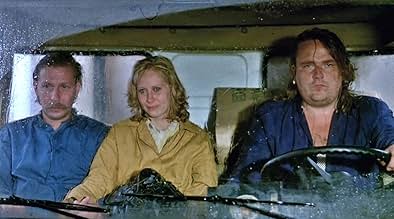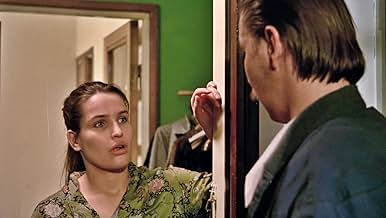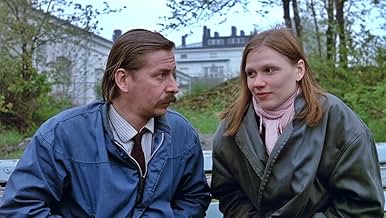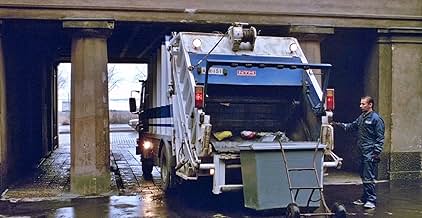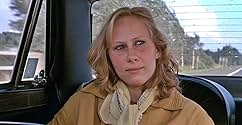VALUTAZIONE IMDb
7,4/10
8156
LA TUA VALUTAZIONE
Aggiungi una trama nella tua linguaAn episode in the life of Nikander, a garbage man, involving the death of a coworker, a love affair and much more.An episode in the life of Nikander, a garbage man, involving the death of a coworker, a love affair and much more.An episode in the life of Nikander, a garbage man, involving the death of a coworker, a love affair and much more.
- Premi
- 1 vittoria in totale
Safka Pekkonen
- Pianist
- (as Safka)
Mato Valtonen
- Pelle
- (as Markku Valtonen)
Sakke Järvenpää
- Staffan
- (as Sakari Järvenpää)
Recensioni in evidenza
Some random observations:
1. Kaurismaki's "paradise" is grimy city streets, garbage, landfills, jails, flophouses, shabby apartments. Two kinds of people inhabit this Eden: either the few, the snooty, the well off – or the subverbal, poorly educated quasi-lumpen stumbling about among the aforementioned sites. The settings, both exterior and interior, belong more to the England of "The L Shaped Room" or "Billy Liar" than to the Scandinavia of travel agency brochures.
2. Kaurismaki delivers virtuoso satire founded upon the stereotypical shy, wordless Finn. But he offers more by pushing beyond stereotype to display a deep familiarity with the kind of people he shows on the screen. An American director similarly so in tune with his people might be Kevin Smith. A possible British counterpart? Maybe Ken Loach.
3. "Shadows in Paradise" is also a testament to Kaurismaki's confidence in the cinematic medium itself, in its power to tell stories using sight and sound without principal reliance on the material of theater or literature – words. We are accustomed to the many films about how XX meets XY, where the characters express feelings, establish plot, indeed, do just about everything through words. Sometimes we even get entire orations, regardless of a film's "realistic" intent. Dialogue rules everything from the quippy screenplays of Nora Ephron or Preston Sturges to the tangly Gallic word-webs of Eric Rohmer. The similarities between Ernest Borgnine and Betsy Blair in "Marty" and Matti Pellonpaa and Kati Outinen in "Shadows in Paradise" end with "Marty's" theatrical, dialogue-soaked provenance. It would be hard to transfer this film of Kaurismaki to page or stage. The story would weaken and likely die in print or any exclusively verbal form.
4. For his comedy Kaurismaki employs a delay-deadpan technique, something familiar to anyone who has seen the "punishment" sequences in Laurel and Hardy's "Tit for Tat' (1935) or who remembers the standup routines of Jackie Vernon in the 60's. Kaurismaki's comedies – and "Shadows in Paradise" is a good example – prove the technique still achieves the desired result: laughs. And like Jackie Vernon or Laurel and Hardy, Kaurismaki makes his words just another ingredient in the comedy. They are well chosen and sometimes hilarious but enjoy no special preference.
5. The movie screened the other night on TCM with the host's caution that this is an unusual sort of romantic comedy – but why the caution? And why the need for any "category" in the first place? To call this a "romantic comedy" and then warn people about its "quirky" or "offbeat"nature does it a double disservice. The warning for possible category transgression either implies that the film is deficient for disregarding certain "rules", or cautions the audience that it will be disappointed, since the movie does things it probably won't accept. But comedy, like so many things in life generally, thrives on surprise. In "Shadows in Paradise", Kaurismaki presents modern, free, prosperous Finland as a bizarre and rather dismal place which he proceeds to mine for laughter and the occasional tear. Whatever a television host labels it, the movie manages to be funny, entertaining – and accessible.
6. A Kaurismaki movie has a distinctive "feel", as strongly trademarked as the comedies of Lubitsch or Sennett.
1. Kaurismaki's "paradise" is grimy city streets, garbage, landfills, jails, flophouses, shabby apartments. Two kinds of people inhabit this Eden: either the few, the snooty, the well off – or the subverbal, poorly educated quasi-lumpen stumbling about among the aforementioned sites. The settings, both exterior and interior, belong more to the England of "The L Shaped Room" or "Billy Liar" than to the Scandinavia of travel agency brochures.
2. Kaurismaki delivers virtuoso satire founded upon the stereotypical shy, wordless Finn. But he offers more by pushing beyond stereotype to display a deep familiarity with the kind of people he shows on the screen. An American director similarly so in tune with his people might be Kevin Smith. A possible British counterpart? Maybe Ken Loach.
3. "Shadows in Paradise" is also a testament to Kaurismaki's confidence in the cinematic medium itself, in its power to tell stories using sight and sound without principal reliance on the material of theater or literature – words. We are accustomed to the many films about how XX meets XY, where the characters express feelings, establish plot, indeed, do just about everything through words. Sometimes we even get entire orations, regardless of a film's "realistic" intent. Dialogue rules everything from the quippy screenplays of Nora Ephron or Preston Sturges to the tangly Gallic word-webs of Eric Rohmer. The similarities between Ernest Borgnine and Betsy Blair in "Marty" and Matti Pellonpaa and Kati Outinen in "Shadows in Paradise" end with "Marty's" theatrical, dialogue-soaked provenance. It would be hard to transfer this film of Kaurismaki to page or stage. The story would weaken and likely die in print or any exclusively verbal form.
4. For his comedy Kaurismaki employs a delay-deadpan technique, something familiar to anyone who has seen the "punishment" sequences in Laurel and Hardy's "Tit for Tat' (1935) or who remembers the standup routines of Jackie Vernon in the 60's. Kaurismaki's comedies – and "Shadows in Paradise" is a good example – prove the technique still achieves the desired result: laughs. And like Jackie Vernon or Laurel and Hardy, Kaurismaki makes his words just another ingredient in the comedy. They are well chosen and sometimes hilarious but enjoy no special preference.
5. The movie screened the other night on TCM with the host's caution that this is an unusual sort of romantic comedy – but why the caution? And why the need for any "category" in the first place? To call this a "romantic comedy" and then warn people about its "quirky" or "offbeat"nature does it a double disservice. The warning for possible category transgression either implies that the film is deficient for disregarding certain "rules", or cautions the audience that it will be disappointed, since the movie does things it probably won't accept. But comedy, like so many things in life generally, thrives on surprise. In "Shadows in Paradise", Kaurismaki presents modern, free, prosperous Finland as a bizarre and rather dismal place which he proceeds to mine for laughter and the occasional tear. Whatever a television host labels it, the movie manages to be funny, entertaining – and accessible.
6. A Kaurismaki movie has a distinctive "feel", as strongly trademarked as the comedies of Lubitsch or Sennett.
Released in 1986, Aki Kaurismaki's VARJOJA PARATIISISSA (Shadows in Paradise) is one of the Finnish filmmaker's earliest efforts, and it stands as one of the most idiosyncratic romantic comedies of all time. The painfully shy Nikander (Matti Pellonpää), a garbage man, means the moody Ilona, a supermarket checkout girl. The film tracks their bumbling attempt to establish a lasting relationship: dates that end as soon as they've begun, a romantic getaway where they each retreat to separate hotel rooms, and rare conversations which employ the absolute bare minimum of words. Nikander's best and only friend Melartin (Sakari Kuosmanen), whom the garbage man only recently met through a spell in jail, gives some needed encouragement.
The film's soundtrack is rooted in early rock-and-roll, though unlike later Kaurismaki films where the characters seem to be living in a 1950s bubble, all the action takes place in contemporary Helsinki. I've criticized Kaurismaki's vision of Finland in other films, but VARJOJA PARATIISISSA does, in my opinion, accurately depict the collection of gloomy, taciturn binge drinkers that are the Finns.
VARJOJA PARATIISISSA is an early work and doesn't show the confidence of later efforts, but it's still quite entertaining, its leads and their struggles extremely charming, and I would recommend the film. Certainly the performances of Pellonpää (in a typical Pellonpää role) and Outinen (who seemingly reinvents herself in every film) will prove quite memorable.
The film's soundtrack is rooted in early rock-and-roll, though unlike later Kaurismaki films where the characters seem to be living in a 1950s bubble, all the action takes place in contemporary Helsinki. I've criticized Kaurismaki's vision of Finland in other films, but VARJOJA PARATIISISSA does, in my opinion, accurately depict the collection of gloomy, taciturn binge drinkers that are the Finns.
VARJOJA PARATIISISSA is an early work and doesn't show the confidence of later efforts, but it's still quite entertaining, its leads and their struggles extremely charming, and I would recommend the film. Certainly the performances of Pellonpää (in a typical Pellonpää role) and Outinen (who seemingly reinvents herself in every film) will prove quite memorable.
Finns have a strange sense of humor, if "Shadows in Paradise" is any indication.
Filmmakers Wes Anderson and Jim Jarmusch have both claimed that they have been heavily inspired by the films of Aki Kaurismaki, and it's easy to see that influence, especially in the case of Jarmusch. "Shadows in Paradise" is a comedy, but lots of people will watch it and not know that they're supposed to be laughing. It's about a garbage collector and his tentative romance with a cashier, both of them plain, inarticulate, and not especially pleasant people to be around. The film has a supremely dead pan tone that, if I'm being honest, gets a bit monotonous. But on the other hand, the movie is pretty short, so even if tries your patience, it doesn't do so for long.
I had recorded both this and another Kaurismaki film, "Ariel," off of TCM and watched them together as a sort of Finnish double feature. Afterwards, I wanted to watch anything that was bright and shiny and featured unrealistically attractive people.
Grade: B+
Filmmakers Wes Anderson and Jim Jarmusch have both claimed that they have been heavily inspired by the films of Aki Kaurismaki, and it's easy to see that influence, especially in the case of Jarmusch. "Shadows in Paradise" is a comedy, but lots of people will watch it and not know that they're supposed to be laughing. It's about a garbage collector and his tentative romance with a cashier, both of them plain, inarticulate, and not especially pleasant people to be around. The film has a supremely dead pan tone that, if I'm being honest, gets a bit monotonous. But on the other hand, the movie is pretty short, so even if tries your patience, it doesn't do so for long.
I had recorded both this and another Kaurismaki film, "Ariel," off of TCM and watched them together as a sort of Finnish double feature. Afterwards, I wanted to watch anything that was bright and shiny and featured unrealistically attractive people.
Grade: B+
This is a minimalistic film showing the daily struggles of ordinary people. Since the theme is quite universal, it is no wonder then, that the film has aged so well. The issues discussed are still relevant. Two lonely people, Nikander & Ilona, who have a very hard life, try to make a go for it. Unfortunately, things don't go very well since they seem to have nothing in common. Money is always a concern & they have to borrow from friends if they feel like having a good time. But the good thing is that the said friends always come up with the money even if they have to steal from their child's piggy bank! Their hard life has left very little space for appreciating the finer things in life. Once when these ill-matched people try to enjoy themselves in a nice restaurant, the class-conscious maitre d' sends them on their way! The film very beautifully points out that there are some sections of the society who do not have much choice. And yet, the resilience of the human spirit is commendable!
The film has a few flaws too. The relationship between the protagonists goes on again off again so many times that after a point, I started to wonder if it's just a matter of convenience for the both of them or is it real love! Also, I felt that Ilona was a bit too selfish & antisocial.
The film has a few flaws too. The relationship between the protagonists goes on again off again so many times that after a point, I started to wonder if it's just a matter of convenience for the both of them or is it real love! Also, I felt that Ilona was a bit too selfish & antisocial.
There's an almost silent film like quality to much of Kaurismäki's work, with that notion of a cinema of images that works without the extraneous use of dialogue or the broader notions of exposition. What this results in is a style of film-making in which the most simple of images tells a story. Simplicity is essentially the key to this film; not simply within the set up, in which a bin man begins a furtive relationship with a supermarket checkout girl, but in the presentation of the film itself. Some critics have used worlds like minimalist or unassuming when discussing the films of Kaurismäki, and in particular, his early trilogy of films, of which Shadows in Paradise (1986) would be the first, but to me, it's more about simplification; stripping away all the usual narrative window-dressing and over complicated presentation of technique to get to the very centre of the story and the heart of these characters.
This was Kaurismäki's third film as a director, though at times you could argue that it feels more like his first. His actual debut came with Crime and Punishment (1983), a typically straight-faced adaptation of the classic Dostoevsky novel, with the more obvious Kaurismäki touches at this point still being in the somewhat embryonic stages. This was followed by the oddly surreal and coolly episodic Calamari Union (1985), a bizarre black and white comedy that drew on the influence of Bertrand Blier's Buffet Froid (1979) to tell the story of fifteen men - fourteen of them named Frank Merciless, and an idiot man-child named Pekka - who leave behind the hopeless working class district of Eira and quest to the near-mythical suburb of Kallio. These films are somewhat ambitious, both in terms of their narrative scope and the technical presentation, suggesting the work of a filmmaker already fairly confident about what cinema is and what his cinema should accomplish. In comparison, Shadows in Paradise seems content to tell an honest story about small, everyday characters in such a way as to not draw too much attention to itself.
There's nothing wrong with that. There is a pure art to the presentation of subtlety - something that Kaurismäki is well aware of - and although I tend to prefer his more inventive and idiosyncratic films, such as the aforementioned Calamari Union, as well as the far greater films like Hamlet Goes Business (1987), Ariel (1988) and The Man Without a Past (2003), there is something quite commendable about a film that attempts to work on such a honest and simple level. The relationship between the characters here is something most of us can identify with, as the odd relationship between Nikander and Ilona propels the story, which is further grounded by Nikander's friendships with his co-workers, Esko and Melartin. As even with Kaurismäki the film works as a result of the perfect casting, with Matti Pellonpää, Kati Outinen, Sakari Kuosmanen and Esko Nikkari, all regulars of the director's work, managing to give so much information about the lives of these characters with gestures so small and exchanges so subtle as to be completely lost on a less attentive audience.
For me, Shadows in Paradise isn't the greatest of Kaurismäki's films, or indeed, the best place to start. However, it does show hints of the style that would be further developed, not least in the two films that would continue and close this loose, thematic trilogy, Ariel and The Match Factory Girl (1990), but in far more ambitious and imaginative projects like Leningrad Cowboys Go America (1989), Drifting Clouds (1994) and Lights in the Dusk (2006). That said, Shadows in Paradise does offer the usual high quality of performance and direction, with the typical Kaurismäki approach to low-key production design and warm cinematography. If you're already familiar with the director's later films then Shadows in Paradise is certainly worth seeking out, if only for the chance to see the formation of that unique style and the soon to be recognisable approach to character and narrative.
This was Kaurismäki's third film as a director, though at times you could argue that it feels more like his first. His actual debut came with Crime and Punishment (1983), a typically straight-faced adaptation of the classic Dostoevsky novel, with the more obvious Kaurismäki touches at this point still being in the somewhat embryonic stages. This was followed by the oddly surreal and coolly episodic Calamari Union (1985), a bizarre black and white comedy that drew on the influence of Bertrand Blier's Buffet Froid (1979) to tell the story of fifteen men - fourteen of them named Frank Merciless, and an idiot man-child named Pekka - who leave behind the hopeless working class district of Eira and quest to the near-mythical suburb of Kallio. These films are somewhat ambitious, both in terms of their narrative scope and the technical presentation, suggesting the work of a filmmaker already fairly confident about what cinema is and what his cinema should accomplish. In comparison, Shadows in Paradise seems content to tell an honest story about small, everyday characters in such a way as to not draw too much attention to itself.
There's nothing wrong with that. There is a pure art to the presentation of subtlety - something that Kaurismäki is well aware of - and although I tend to prefer his more inventive and idiosyncratic films, such as the aforementioned Calamari Union, as well as the far greater films like Hamlet Goes Business (1987), Ariel (1988) and The Man Without a Past (2003), there is something quite commendable about a film that attempts to work on such a honest and simple level. The relationship between the characters here is something most of us can identify with, as the odd relationship between Nikander and Ilona propels the story, which is further grounded by Nikander's friendships with his co-workers, Esko and Melartin. As even with Kaurismäki the film works as a result of the perfect casting, with Matti Pellonpää, Kati Outinen, Sakari Kuosmanen and Esko Nikkari, all regulars of the director's work, managing to give so much information about the lives of these characters with gestures so small and exchanges so subtle as to be completely lost on a less attentive audience.
For me, Shadows in Paradise isn't the greatest of Kaurismäki's films, or indeed, the best place to start. However, it does show hints of the style that would be further developed, not least in the two films that would continue and close this loose, thematic trilogy, Ariel and The Match Factory Girl (1990), but in far more ambitious and imaginative projects like Leningrad Cowboys Go America (1989), Drifting Clouds (1994) and Lights in the Dusk (2006). That said, Shadows in Paradise does offer the usual high quality of performance and direction, with the typical Kaurismäki approach to low-key production design and warm cinematography. If you're already familiar with the director's later films then Shadows in Paradise is certainly worth seeking out, if only for the chance to see the formation of that unique style and the soon to be recognisable approach to character and narrative.
Lo sapevi?
- QuizTowards the end, there's a scene where Nikander's friend talks about a problematic fellow worker named Mikkonen. Matti Pellonpää, who plays Nikander here, would later play Mikkonen in Ariel (1988), the second part of the Proletariat trilogy directed by Aki Kaurismäki.
- BlooperWhen Nikander and Ilona leave the gas station and ride down the road, they pass a white car. The white car is standing still in the middle of the road. Presumably they drove so fast that they passed the white car, but it stands still.
- ConnessioniFeatured in Century of Cinema: Scandinavie, Stig Björkman (1995)
- Colonne sonoreHerbstlaub
Written by Klaus Treuheit
Performed by Klaus Treuheit
I più visti
Accedi per valutare e creare un elenco di titoli salvati per ottenere consigli personalizzati
Dettagli
Botteghino
- Lordo in tutto il mondo
- 298 USD
- Tempo di esecuzione
- 1h 14min(74 min)
- Mix di suoni
- Proporzioni
- 1.85 : 1
Contribuisci a questa pagina
Suggerisci una modifica o aggiungi i contenuti mancanti



